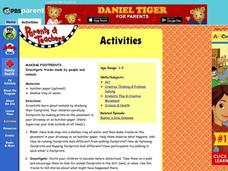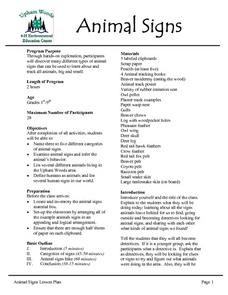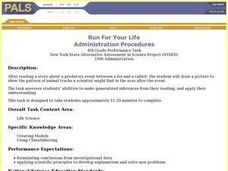National Wildlife Federation
Tricky Tracks
While wildlife may not always be visible, they leave their marks behind for people to discover. A wildlife lesson has pupils explore the characteristics of animal tracks. They learn different types of tracks, as well as what tracks tell...
Purdue University
Animal Diversity and Tracking
What exactly are those glowing eyes in the night? Learners run an experiment to attract local wildlife and then document the number of visitors by identifying their tracks. They then analyze the data to draw conclusions about the types...
Curated OER
Introduce Vocabulary: Animal Tracks (Dorros)
What kind of animal made those tracks? Explore some wild vocabulary in context as learners listen to Arthur Dorros' book, Animal Tracks. Before your read this, introduce the new words like bother, dam, reed,...
Curated OER
Fossil Formation
A fossil is worth a thousand words! Individuals craft their own amber fossil of an insect in addition to molds and casts of seashells. A third activity takes the lesson a notch higher: Learners measure stride lengths between tracks and...
Curated OER
Making Footprints
An interesting way of looking at footprints and tracks. Pupils step into a tray of water, and make footprints of various kinds on butcher paper. They tip toe, run, hop, and walk. Then, they take a close look at the differences between...
Curated OER
Tracks along the Trail
Students identify animal tracks outdoors. In this animal life lesson, students go outdoors and find several different animal tracks to identify. Students also discuss how animals must adapt in the winter months.
Curated OER
Science Jeopardy - The Earth Sciences
The earth sciences are the focus for this Jeopardy-style review game. Categories include geology, space, scientific investigation, meteorology, and oceanography. Diagrams and pictures are involved with most of the questions, making this...
Curated OER
MUD-A Walk
Students investigate their tracks to determine the number of footsteps it takes to travel the entire length of their bodies. Then they determine the taller of two children and the shorter of two children with their tracks. Students also...
Curated OER
Animal Signs
Students discuss the many different types of animal signs that can be used to identify and track all types of animals. They examine tracks, trails, homes, territory markings, and even "scat" left by animals and attempt to identify the...
Curated OER
Animal Signs
Students discuss the many different types of animal signs that can be used to identify and track animals. They participate in an hands-on activity in which they examine tracks, trails, homes, territory markings, and even "scat" left by...
Curated OER
Making Tracks
Students cast animal tracks on a field trip. They split up to capture tracks from different areas and use plaster of Paris to mold to the footprint. They bring casts back to class, create a negative mold and paint it black.
Curated OER
Track Stories
Students identify animal tracks. For this animal track lesson, students look at "track stories" and identify the animals that made the tracks. Students discuss if they believe the animals are predators or prey.
Curated OER
Identifying Animal Tracks
In this identifying animal track instructional activity, students look at the pictures of the animals and connect the animals with its tracks.
Curated OER
Animal Tracks
In this animal tracks worksheet, students look at the pictures of the animals, then match the five carnivores to the correct track pattern.
Curated OER
Quizzes: Animal Tracks
In this science worksheet, learners fill in the circles next to pictures of 11 animals with the number of toes on each animal's foot. Answers are provided on the page.
Curated OER
The Mystery of the Disappearing Tracks
Fifth graders watch as the teacher projects a series of pictures on the wall showing bird tracks heading toward each other but not meeting, two tracks converging into one, and two tracks converging and then being scuffed up. They write...
Curated OER
Neat Feet
Students view a video and discuss different kinds of feet found in the animal kingdom. They make prints using paint, rubber stamps and their own feet and then measure and compare the tracks.
Curated OER
Animal Tracks
Second graders study the different tracks that animals make. They identify similarities and differences in the tracks and formulate opinions based on facts.
Curated OER
Animal Tracks
In this animal tracks worksheet, students match a set of animal pictures to their tracks, 5 animals total. A reference web site is given for additional activities.
Curated OER
Animal Tracks
In this animal tracks worksheet, students draw lines to match pictures of animals to their tracks. A reference web site is given for additional activities.
Curated OER
Animal Tracks Matching Worksheet
In this animal tracks worksheet, students match pictures of animal tracks that are located at the bottom of the page with the animal pictures at the top of the page. They see a cardinal, a fox, a fawn, and a fox.
Curated OER
Sand Tracks
Students examine the different markings animals make while walking through the sand. In an activity, the teacher hold up the same tracks individually and they must guess the animal who made them. They discuss the results as a class to...
Curated OER
Tracking in Wisconsin
Students examine how to identify the tracks and track patterns of some common Wisconsin animals. They examine how the footprints of these animals reveal how different feet help different animals navigate the winter snow or survive in...
Curated OER
Run For Your Life
Students draw a picture of animal tracks a scientist might find after they read a story about a fox chasing a rabbit. They make up a key to represent the foxes' tracks and the rabbit's tracks.

























